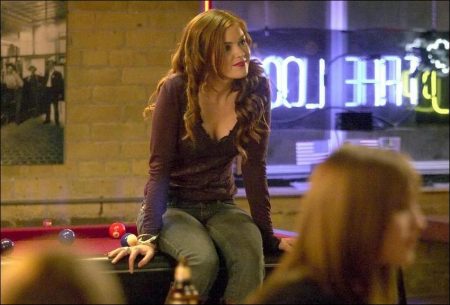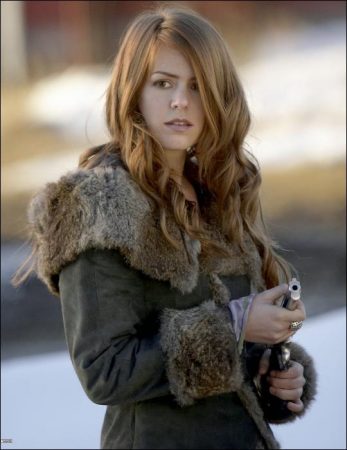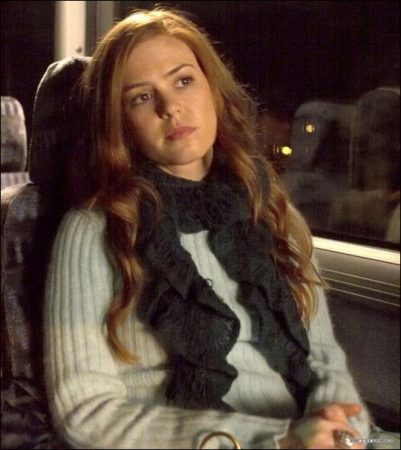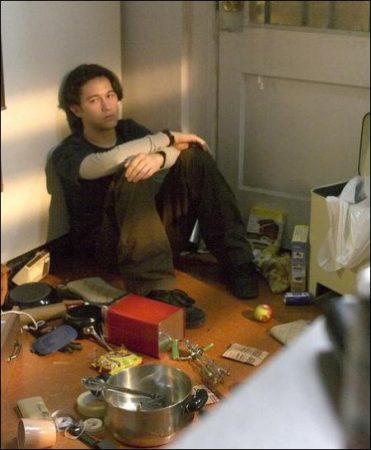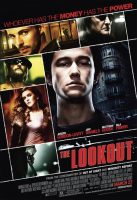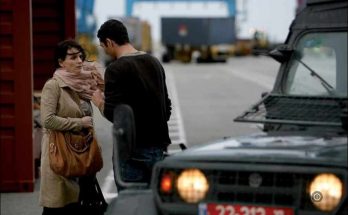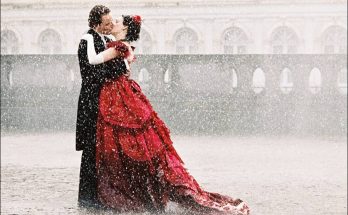Tagline: Whoever has the money has the power.
From writer / director Scott Frank (Out of Sight) comes The Lookout, an inventive and moving new riff on the crime thriller with a most unusual person at its center: Chris Pratt (Joseph Gordon-Levitt), a night janitor who, in the wake of a traumatic car accident, suffers from a leaky memory and an unreliable sense of self that makes even everyday situations challenging… and changes everything when he finds himself swept up in a bold, multimillion dollar bank heist.
Frank’s captivating tale revolves not only around the crime but around the alternately heartbreaking and exhilarating re-emergence of Chris Pratt, who was once a Golden Boy athletic hero in his small midwestern town. Chris had it all – a beautiful girlfriend, a well-heeled family and a shining future. But after a serious accident, Chris has found himself in a strange new world where the most basic things seem to fall through holes in his memory and nothing quite makes sense. Unable to make it on his own, he lives with his mentor in navigating this surreal life – the wisecracking, fiercely independent blind man, Lewis (Jeff Daniels). For a job, Chris sweeps the floor at the bank, waiting for his halted life to come unstuck.
Things suddenly shift when he meets Gary Spargo (Matthew Goode), an old school acquaintance and street philosopher who begins to revive Chris’ shattered confidence, even helping him find a girlfriend – albeit a stripper named Luvlee Lemons (Isla Fisher). But Gary has bigger plans, and when he recruits Chris into his grand plan to rob the bank where he works, Chris appears to be in way over his damaged head. As the bank heist unravels into chaos, both Chris’ uncertain future and even more importantly Lewis’ survival are on the line. Now, it is up to this young outcast who can’t always think straight to figure out how to outwit and take down his manipulators… his own way.
A Thriller Driven by Emotion
Scott Frank, the acclaimed screenwriter who makes his directorial debut with THE LOOKOUT, loves thrillers, but even more than thrillers, he loves great characters. This first became abundantly apparent in his early career with his screenplay for the imaginative and romantic thriller Dead Again, directed by Kenneth Branagh, as well as his moving tale of a misunderstood child genius in Little Man Tate directed by Jodie Foster.
Frank also became known as the ultimate adapter of one of the most character-driven crime novelists today, Elmore Leonard, with the run-away hit Get Shorty. This was followed by Out of Sight, an unsparingly clever adaptation of another Leonard novel that put the zigzagging romance between a rogue criminal and a female Federal Marshall front and center. Directed by Steven Soderbergh, and featuring the breakthrough performances of George Clooney and Jennifer Lopez, the film garnered Frank an Academy Award nomination for Best Adapted Screenplay.
Now, with THE LOOKOUT, Frank puts one of the most unconventional and compelling sets of characters he’s ever written at the heart of an audacious small-town crime. His lead character, and completely unlikely hero, is the kind of person that writers typically avoid – a braindamaged janitor who appears to have little hope for any of the things people usually strive for in life: love, money or a meaningful future. Heartbreaking and seriously damaged, Chris Pratt might not be what anybody expects as the big gun of a heist movie – but that’s exactly what intrigued Scott Frank.
“I’ve always loved those European thrillers that were dark and interesting and full of people that you really care about,” says Frank. “There’s this overriding sense of dread and suspense because you’re so invested in the characters – and I always wanted to write a movie like that.”
Two additional elements conspired together to inspire Frank to pen THE LOOKOUT. “I knew someone who had a pretty horrific head injury and the fascinating thing about him is that, when woke up, he was somebody else. I thought a person going through that kind of terrifying situation would be very interesting to locate inside a thriller,” he explains. “And while I was thinking about that. I read a little about the banking situation in the Midwest and how there were all these little banks that would once or twice a year receive USDA money, so that on one particular night there might be several million dollars in a vault that usually contained very little. These two stories started to come together and THE LOOKOUT flowed from that unusual person in that unusual situation.”
Frank grounded THE LOOKOUT in a searingly realistic and consistently fascinating portrait of Chris Pratt’s descent from an idolized young athlete with what he confesses is “the perfect life” to a young man living amidst the confounding labyrinth of brain damage. Frank gave Chris a series of bizarre yet medically true-to-life elements of traumatic head injury: a lack of short term memory, which causes him to have to write all essential information in a notebook he must carry at all times; lack of inhibition and emotional liability, which causes him to blurt out things he doesn’t mean to say and to be swept away by intense emotions that come out of nowhere; and a complete lack of organization skills, which can turn a simple task like opening a can of food into an epic battle.
It’s no wonder that Chris comes to rely on the savvy of his room-mate, Lewis, another of THE LOOKOUT’s deeply fascinating characters – a blind man with a sharp tongue and a wicked sense of humor who literally tries to lead Chris’s way through the darkness. “These are characters who I think have a real emotional pull,” says Frank. “And I wanted the suspense of the film to emanate first from that.”
The story of THE LOOKOUT first came to Frank early in his career, when he began building on the bare bones of the screenplay with producers Walter Parkes, Laurence Mark and Executive Producer Laurie MacDonald, all who would remain devoted to the project for more than a decade. “Without Walter, this movie would never have existed,” says Frank. “He was key in the development, even traveling with me to Kansas City early on to conduct research for the screenplay.”
“Scott first told me the general idea for THE LOOKOUT in the late 1980s and it was literally one of the first pitches I heard as a producer, but soon after, Scott got LITTLE MAN TATE off the ground and put THE LOOKOUT aside,” recalls Mark. “The project continued to evolve over the years, but I always felt this movie was in Scott’s DNA. What’s exciting about it is that it is an emotional thriller, and very much a tale from a writer’s heart. The touchstone here is the theme of how stories get you through life and how sometimes you have to start at the end and work your way back to the beginning.”
Adds Walter Parkes, who would soon become the co-head of DreamWorks Pictures, after first developing the project at Amblin: “What always fascinated me about this project is the blending of genres – on one level, it’s a taut crime thriller, but on another it’s also a pure character piece about a kid trying to find his place in the world. The whole theme of the Golden Boy who loses everything is so compelling and universal, and one I think that has always been important to Scott.”
Parkes was especially intrigued by how the screenplay integrated action with insight into the inner workings of the human brain. “I had previously been involved in Awakenings about the neurologist Oliver Sacks and one of the wonderful things Sacks does is to look at the gifts that neurological deficits can bring. It’s really interesting that Chris Pratt turns out to have certain strengths that allow him to save the day in a completely unexpected manner,” says the producer.
Even as Scott Frank’s writing career took off in all kinds of unexpected directions, the tale of Chris Pratt continued to haunt him. The script continued to go through new iterations, drawing the attention of some of Hollywood’s top talent in various tantalizing configurations, but never quite happening. “For years, THE LOOKOUT was one of the great un-produced screenplays in Hollywood,” notes Parkes. “What was clear is that this was a very singular piece of writing, and eventually we all started to think this was a fitting piece for Scott to make his directorial debut.”
But taking a chance on a first-time director brought a whole new complication to what was already a daring screenplay with an unconventional hero. Just as the project once again began to flounder, Spyglass Entertainment producers Gary Barber and Roger Birnbaum came to the rescue – and added their considerable support to putting the long-awaited project at last into production.
Barber and Birnbaum have a knack for spotting thrillers that break the mold, as they did with the acclaimed box-office phenomenon THE SIXTH SENSE. They were instantly impressed with what Scott Frank had accomplished with THE LOOKOUT. “We thought it was a terrific story – at once a taut, smart thriller that keeps you on the edge of your seat and a very emotional experience for the audience,” says Birnbaum. “It’s a truly remarkable piece of writing and we loved it so much, we knew we wanted to make it.”
They also supported the idea that Frank should direct the picture, despite his lack of experience behind the camera. “When we met with Scott, we realized that he already had every single shot in his mind and a great overall vision for the film,” says Gary Barber. Adds Birnbaum: “Scott clearly has all the makings of a great director, as well as an amazing writing. He’s very clear, very professional and most of all, very passionate. As a young director, he likes to share ideas and kick things around and quite honestly that makes the whole process of making the film much more fun and creative.”
After so many years devoted to developing the screenplay, Parkes and Mark were equally impressed with Frank as a director. Says Parkes: “What was surprising is that Scott never let his creative ownership of the movie get in the way of his directing. I was really impressed with his ability to let go and allow the interpretation of his material to happen organically.” Mark continues: “Scott really has his wits about him as a director. He proved to have an extraordinary way with actors, with a very natural feeling for how to guide them in complex performances.”
Now, Scott Frank faced what he knew would be the biggest hurdle to making this story work on the screen: finding the cast who could do his iconoclastic characters justice.
A Brain-Damaged Hero
At the heart of THE LOOKOUT’s building tension and intensity is Chris Pratt, a young man whose very life has become an insoluble mystery without any clues, even before he becomes involved in a bank heist.
Still in the early stages of recovery from a severe brain injury, Chris battles with the basic things the rest of us take for granted – what to say, who to remember, even how to make dinner. But, as Joseph Gordon-Levitt plays him, he is also a man who harbors much more inside him that it appears, a man desperately in search of who he really might be in life. He might look like a patsy, like a nobody, like the guy that other people can use, but he proves that he’s much more than that.
Writer-director Scott Frank searched endlessly for an actor who could turn Chris into a real human being in a palpably tough predicament, who could make the role raw, moving and even funny at times, without a drop of sentiment or the maudlin. In the beginning, he wasn’t entirely sure what he was looking for. “I never have preconceived ideas in my head when I write because you’d be disappointed if you don’t get who you had in my mind for the character. So I actually often write with dead actors in mind,” he admits.
Now, however, he needed someone very much alive who could handle all the complexities of the part – a risk-taker with his own ideas. After a year of searching and endless auditions in vain, he’d nearly given up.
“I thought I’d seen just about everyone,” says Frank, “but then I saw a trailer for ‘Mysterious Skin’ with Joseph Gordon-Levitt and I thought ‘I don’t think I’ve seen that guy.’ When he came into my office, there was just no longer a question. I knew instantly he was going to be in the movie. Most people I’d auditioned had a tendency to play to Chris’s disability, to really emphasize everything that’s wrong with him. But what Joe did that was so different and daring was to simply bring a profound stillness to character. He was so quiet and still, that alone was haunting. You didn’t feel you were watching someone mimic a head injury — it was much more powerful and real.”
Says Walter Parkes of Gordon-Levitt: “We’ve all been kind of waiting for the next generation of great American actors and I think Joe is a part of that. His technique is completely naturalistic and invisible.”
Adds Mark: “The danger of this role was always that it might be over-done, but Joe shows that less is more by painting a very powerful portrait with very few brushstrokes.”
A former child actor, Gordon-Levitt is perhaps best known for his role as Tommy Solomon in the oft-acclaimed, long-running sitcom “3rd Rock From the Sun.” His films include A River Runs Through It, The Juror, 10 Things I Hate About You, Manic, and Mysterious Skin and he most recently took the lead role in the critically praised indie Brick, which drew a number of awards in 2006. But THE LOOKOUT pushed him in ways no other role had before.
Right away, Gordon-Levitt knew THE LOOKOUT was going to be different. “It’s rare that I get a script I want to read all the way to the end,” he comments. “But this script was just so well written and every character was such a full human being, it made me excited to be an actor. With Chris Pratt, Scott Frank had created a hero who has so many layers to him, who is so complicated, there’s no one way to feel about him.”
He continues: “The movie also blends two kind of stories that don’t usually go together. On the one hand you have this kind of fun, exciting bank robbery and on the other you have these heartfelt, in-depth characters. I think it’s the humanity of the characters that makes the heist part so much more interesting.”
Gordon-Levitt found that the more he examined Chris’s character, the more thought provoking, and relatable, he and his frightening predicament became. He observes: “I think Chris’s story is really about what happens when things don’t turn out the way you think they will. He was this gifted athlete with a beautiful girlfriend and his future was supposed to be set. But in just one night, everything changed. Now, he’s a completely different person and the question is: how do you reconcile a past that had so much promise with a present that offers nothing? Chris wants to be what he was, but he is who is. It’s something I think we all wonder about on those days when you feel worthless, when nothing’s going right. How do you deal with the world when it isn’t what you planned for?”
To prepare for the role, the actor delved into the often bizarre and challenging world of the brain-injured, spending time with several young men who had survived accidents similar to what happened to Chris. But, he quickly discovered there’s nothing cut-and-dry about playing a person with head trauma. “No two cases of traumatic brain injury are the same,” he explains. “I spent time with different people with different conditions and you realize that everybody’s brain does something different when it gets a hard blow, so the symptoms aren’t alike in any two people. So, on the one hand there were certain things I wanted to make sure to be accurate about with Chris, but one the other I had some freedom to say ‘well everybody’s different, and this is how Chris is.’”
He also learned that brain injury is about “absence,” the things you no longer have – such as memory, language, logic, perception – instead of the things you do. Subtlety was key to his approach. “Another thing that was interesting to me is that on the surface a lot of people with brain injury seem just like a normal person. It takes awhile to realize something’s not quite right.
That’s what Chris is dealing with. No one can see how hard he is struggling,” he says. Gordon-Levitt even boned up on his neurology, diving into the latest research on how the brain works, and what happens to people when it doesn’t. “I did a lot of reading and learning a lot of stuff about the brain I didn’t know before. It’s fascinating to find which part of your brain deals with vision, or with finding the right words, or feeling horny or remembering something. And it’s also interesting to realize that we’ve only just scratched the surface in learning about the brain. There’s so much we still don’t know.”
But it is one thing to read about what happens when the brain’s inner workings go awry and another thing to actually become that person unmoored from the ordered, rational universe we usually take for granted. Gordon-Levitt had to do the opposite of what people usually do in life – he had to cultivate confusion, discourage himself from thinking in a linear fashion, and shrink into his own private world. To get deeper into Chris’s alienated, lonely headspace, he even isolated himself from friends and co-workers for a month, speaking very little.
“I got so into it, after awhile I couldn’t think straight myself,” Gordon-Levitt notes. And he quickly found that Scott Frank wasn’t going to provide a lifeline via an easy set of rote instructions for him. “We did some rehearsal but a lot less than I expected,” Gordon-Levitt recalls. “Scott could have gone symptom by symptom with me, defining Chris’s brain injury or he could have gone memory by memory into his past, but he didn’t do that. He showed a lot of trust and confidence in what he wrote and a lot of faith in me to just kind of let me take it in the way it occurred to me in the moment. I think that really freed me up to do my best.”
A Blind Man Leads the Way
No less a casting challenge was the role of Lewis, Chris’s blind, acid-tongued roommate and surrogate guardian, who teaches Chris to remember thing by telling the story backwards. Once again, Scott Frank went in an unexpected direction, casting Golden Globe nominee Jeff Daniels in a role unlike any the versatile star has been seen in before. Daniels, who made his big breakthrough with Jonathan Demme’s surreal comedy “Something Wild” and has gone on to a remarkably diverse career, most recently came to the fore with two completely different roles in Noah Baumbach’s “The Squid and the Whale” and George Clooney’s “Good Night and Good Luck.” It was Daniels’ stunning turn in the “The Squid and the Whale” that caught Frank’s attention.
“I saw a part of Jeff in that movie I’d never really seen before,” he says, “and I realized he could be funny and reprehensible and sympathetic all at the same time. I just saw all this stuff going on and I thought he’d be a lot of fun to work with. And, as with Joe, the minute we sat down to talk about it, I knew he was going to be fantastic.”
Adds Walter Parkes: “With this role and his other recent work, I think Jeff is emerging as one of our great American character actors.”
Daniels was lured to THE LOOKOUT by the script. “I’m just looking to do good writing,” he says, “and this script was a character-driven thriller which is full of surprises, where you never know what’s going to happen next but you’re pulling the whole time for this kid to make it through. It was so well-written it immediately made me say ‘sign me up.’”
Once signed up, however, Daniels had a major challenge to meet, especially in shattering the mold of a character type that has become all too much of a movie cliché: the blind man. “What Jeff did with this role was terrific,” says Frank. “We talked about all the different ways people can look and behave when they’re blind but what Jeff did that was so great, was essentially nothing. His portrait was so subtle. We had met with someone who was blind, and at first, you had no idea he couldn’t see you. He pretty much even looked you in the eye, which he said he had learned to do to make people more comfortable. And Jeff picked up on all of that so well.”
Daniels also picked up on who Lewis is at heart. “He’s definitely a free spirit and you never know what he’s going to say or do. He’s never let blindness be a handicap to him and I think he probably lives life more now than he did when he was sighted, so he’s a very interesting character to play,” he says.
To further dive into the experience of blindness, Daniels used the help of the Michigan Commission for the Blind in his home state. “They taught me the basics of reading Braille and using the cane and things like going up and down stairs,” he explains. “But even more importantly, I got to meet a lot of people who’ve lost their sight and really see the attitude of these people and how they’ve overcome their problems. It was really a joy to look at life the way they do, so to speak.”
Daniels was especially intrigued by his character’s relationship with Chris Pratt — for theirs is no ordinary friendship. “They really need each other,” Daniels notes. “Lewis is trying to walk Chris through his new situation and help him get back on his feet emotionally but Chris also helps Lewis. It’s a real give-and-take. I like that about them.”
They might appear like an odd couple of sorts, but on the set the two actors found a rapport that allowed the relationship between Chris and Lewis make to perfect sense. Says Gordon-Levitt of working with Daniels: “There was just an instant connection between me and Jeff. Lewis is so important to Chris because he’s the one person who doesn’t see him through the past, for who he used to be. He’s actually friends with the person Chris is right now.”
Daniels is effusive about Gordon-Levitt’s performance. “He threw himself completely into every single shot, every single day,” Daniels comments. “He’s always been a very good, inventive actor, but I think after this role, he’s really going to take off.”
He has equal praise for Scott Frank. “I’ve worked with a lot of a first-time directors and the great thing they bring to a film, which Scott very much does, is passion. He showed up every day ready, excited and full of adrenaline. And of course, when the script is this great, the actors really want to deliver,” says Daniels.
Character-Fueled Villains: The Lookout’s Bank Robbers
To complete the main cast, Scott Frank set out in search of the gang of thieves who recruit Chris Pratt into their plan to steal from the bank. Once again, he had an unusual bill to fill. Far from your standard villains, Gary Spargo and the stripper Luvlee Lemons are complicated people with their own quirks, foibles and stories to tell.
As Gary, the thief who also serves as an inspiration for Chris to come out of his shell, Frank cast Matthew Goode, the British newcomer most recently seen starring as Scarlet Johansson’s wealthy fiancé in Woody Allen’s acclaimed Match Point. It was this performance that attracted Frank. “Matthew was so surprising in that film, I felt he could do anything,” says the director. “He has a real chameleon-like quality and a dark sense of humor which I really loved and wanted him to bring to the role. The most important thing was that he not be just the bad guy, but a lot more interesting than that.”
The role was definitely interesting to Goode, although it was nothing like the comedic and romantic roles he’s played before. “I started reading this script and I thought, this is really a cut above,” he recalls. “And Gary was such a great character. Since I had just shaved my head, I thought maybe I’ve got a chance for this. Gary is such a mysterious character that there was a lot of leeway to take it in different directions.”
It was Goode’s audition that sealed the deal. Explains Roger Birnbaum: “We’d all seen Match Point and thought he was incredible, but Gary was such a different role that we kind of raised our eyebrows at the idea. It was a question mark, but when he came in to read, his head was shaved and he was so dark and handsome and dangerous looking we realized he could be anything. It was a stunning audition.”
Goode understood that the core of the performance had to be the relationship Gary builds with Chris, pulling him with charm, finesse and even a little spiritual uplift into the bank heist and the betrayals to come. “To Gary, I think Chris represents the Wonka Golden Ticket. He knows that he works at the bank so he does everything he can to become a part of his world,” says Goode.
To make this work, Goode also had to find a rapport with Joseph Gordon-Levitt. “To be frank, at first I wasn’t sure if we would get along because he’s so very, very intelligent,” Goode confesses. “But I thought he was amazing. He has kind of Johnny Depp qualities – he’s very intense and he really carried the film. Long story short, it turned out to be a real pleasure.”
For Goode, the biggest challenge was perhaps not so much in the character as in the mechanics of becoming a career criminal. “I’ve never used a gun before,” he admits, “so that part was quite daunting. But the main thing about Gary is that he lives in a world where everyone is expendable, and he knows it. For him, it’s all about getting the money, getting away with it and living the life while you can.”
Gary might see Chris Pratt as expendable, but even so, he winds up expanding Chris’s horizons, especially when he introduces him to his stripper friend and partner-in-crime, Luvlee Lemons, whose mission is to seduce Chris. Once again it was a stand out audition that convinced Scott Frank to cast Isla Fisher, recently seen in the hit comedy The Wedding Crashers.
“We met with lots and lots of young women – it was a hard job but somebody had to it!” laughs Frank. “And then Isla came in and just lit up the room and was so clearly right for the part. We also had her read with Joe and they had great chemistry together. What I loved is that Isla brought a more childlike character to Luvlee. Her whole approach was that she didn’t want to play a femme fatale – instead, she wanted to play someone who was more naïve, who didn’t really want to be aware of what was going to happen to Chris.”
Fisher explains her take on Luvlee: “There’s a pathos and a mystery to her that I think makes her really beautiful. I see her as a people pleaser, someone who basically operates only through her heart and doesn’t filter anything through her head. Mostly she likes to feel needed and wanted, so she wants to fit in with Gary and his gang. But she’s cultivated more childish innocence than worldly smarts. She’s so in the moment that she was a lot of fun to play and it was especially interesting to play a character like that reacting to people who are brain damaged and blind.”
Adds Mark: “Isla just can’t help but be surprising in whatever she says and does. She puts a distinctive spin on whatever character she plays.”
In her seduction of Chris Pratt, Luvlee actually starts to fall for him, although that was never the plan. “I think she’s attracted to Chris because he doesn’t really have any sense of identity and she can relate to that,” Fisher explains. “Really, they have a beautiful little love affair and I think they each gain a lot from each other.”
Fisher loved working with Joseph Gordon-Levitt, Jeff Daniels and Matthew Goode but most of all, her heart belonged where all the cast seemed to have theirs – with Scott Frank’s writing. “I was often pinching myself on set, realizing that I was going to get to say these incredible words. I loved every minute,” she sums up.
To add the final touch of menace to the bank-robbing gang, the filmmakers also set out on an extensive search to find Bone – the taciturn, blood-curdling strongman of the group. They found what they were looking for in the larger-than-life presence of Greg Dunham, who makes his feature film debut in THE LOOKOUT. “The character of Bone was always primarily a visual idea and Greg has such a great face,” says Scott Frank of his casting. “The way he looks and the sound of his voice were perfect for the character.”
With his full cast assembled, Frank decided to give them each a wide-open canvas on which to paint their characters. “We all talked a lot about the characters – who they are, where they come from, what they want and those generals sorts of things. But I had such talented actors I didn’t want in any way to hobble them with my own preconceived ideas. I didn’t want in any way to impose limits on them,” Frank comments. “I really wanted them to come up with things on their own. Once we all understood the story, I wanted to see where and how far they could run with it – and the results were well worth it.”
Stillness and Action: Shooting the Lookout
Infused with the stark rhythms and striking visuals of the American heartland, THE LOOKOUT was filmed entirely in Winnipeg, Canada – a dead ringer for the U.S. Midwest. To give the story a visual ambiance that echoes the inner stillness and outer discord of its lead character, Chris Pratt, Scott Frank worked closely with an especially creative team of craftsmen.
Frank knew he would need an inventive and emotive cinematographer, which is why he turned to Alar Kivilo, whose films, including A Simple Plan and The Ice Harvest have demonstrated a strong affinity for finding the lyricism in icy, snow-covered landscapes. After meeting with Kivilo, the director knew Kivilo had the eye for the job. “He so clearly understood the story and the characters and he got that the film needed to be shot from the inside out – not imposing a style on the story but amplifying the characters through the photograph,” says Frank. Kivilo and Frank envisioned every shot and angle together before they ever hit the set.
“Alar and I basically spent a lot of time making the movie in our heads before we actually made the movie,” Frank muses. “The planning was an important part of it all.”
Says Mark: “Alar and Scott managed to use Winnipeg to capture both the emptiness and the beauty of the Midwest – which echoes all the themes of the story.”
Kivilo shot the film with the brand-new Panavision Genesis Camera, the same system pioneered in such recent films as Superman Returns and Apocalypto. The results amazed everyone in the cast and crew. “I’ve worked on digital films before but between the new camera and Alar’s skill, this film has all the grace and beauty of anything on celluloid,” says Joseph Gordon-Levitt.
Adds Roger Birnbaum: “Alar’s work on this film was extraordinary. He manages to give it both the intensity of a thriller and the intimacy of a character drama, as well as a real sense of the heartland.”
Further building the atmosphere of THE LOOKOUT is the work of production designer David Brisbin, whose career began with the indie classics Drugstore Cowboy and My Own Private Idaho and has recently included the Jane Campion thriller In The Cut and The Exorcism of Emily Rose.
It was Brisbin who faced the task of turning the small city of Hartney in Canada into Noel, Kansas – and his sets put many in mind of the gorgeously desolate paintings of the American master Edward Hopper. “The town itself was the perfect casting,” notes Scott Frank. “It had a fantastic look with the grain elevator and the way it appears so empty at night. David and I seemed to share all the same sorts of visual ideas and thoughts on palette so it was a great collaboration.”
Another favorite location comes at the film’s climax, as a final showdown takes place against a wide-open horizon of lonesome plains. For this scene, Brisbin and Frank brought the cast and crew to the small country village of St. Pierre-Joly in Manitoba. The town’s rolling farmland look was ideal, at least on the surface. “Everything that could go wrong did go wrong there!” recalls Frank. “We had mud, we had rain, we had huge winds. But the weather gods did give us one gift – this beautiful fog rolling over the barren landscape which made for some stunning shots.”
Frank notes that the film’s hypnotic rhythm involves moments of haunting stillness that explode into action, and one of the biggest action sequences was the car crash that left Chris Pratt so grievously wounded and haunted by the past. To create a visceral, original crash that would convey just how fast Chris’s life changed, Frank relied on the talents of stunt coordinator Steve Ritzi. “The challenge was putting something together that felt terrifying without feeling like a stunt,” Frank explains. “We spent four months planning the crash, practicing with the car and really figuring out every move. Steve structured it, rehearsed it and placed every single camera to capture it best.”
Still, it wasn’t the action of THE LOOKOUT that pushed Frank most as a first-time director. “This movie has shoot-outs, car crashes, a bank heist, all the things you would think a director would be afraid of. But I’ll tell you what scared me the most,” he confesses. “It was shooting the scene of Chris at his family’s Thanksgiving dinner. Finding a way to keep the energy going in that scene and then contrasting it with the Thanksgiving dinner at the farmhouse was the most challenging thing of all, because it was about working with so many different characters and finding a rhythm to match them all together.”
The way that rhythm came together impressed everyone on the set. “You really got a sense of a kind of wave of energy occurring, where you had a whole cast and crew of people at the very beginning of doing their best work and that’s an exciting moment,” observes Walter Parkes.
In Frank’s vision, no matter what was happening on the set, it would always come back to the characters and especially to Chris Pratt. After all, it is Chris’s reality that continues to haunt even after the action is over – perhaps because his confusion, vulnerability and, ultimately his courage, reminds us of the mystery of being human.
The Lookout (2007)
Directed by: Scott Frank
Starring: Joseph Gordon-Levitt, Isla Fisher, Carla Gugino, Matthew Goode, Aaron Berg, Kalyn Bomback, Alex Borstein, Paul Christie, Jeff Daniels, Sergio Di Zio, Alberta Watson
Screenplay by: Scott Frank
Production Design by: David Brisbin
Cinematography by: Alar Kivilo
Film Editing by: Jill Savitt
Costume Design by: Abram Waterhouse
Set Decoration by: Stephen Arndt
Art Direction by: Dennis Davenport
Music by: James Newton Howard
MPAA Rating: R for language, some violence and sexual content.
Distributed by: Miramax Films
Release Date: March 30, 2007
Views: 85
